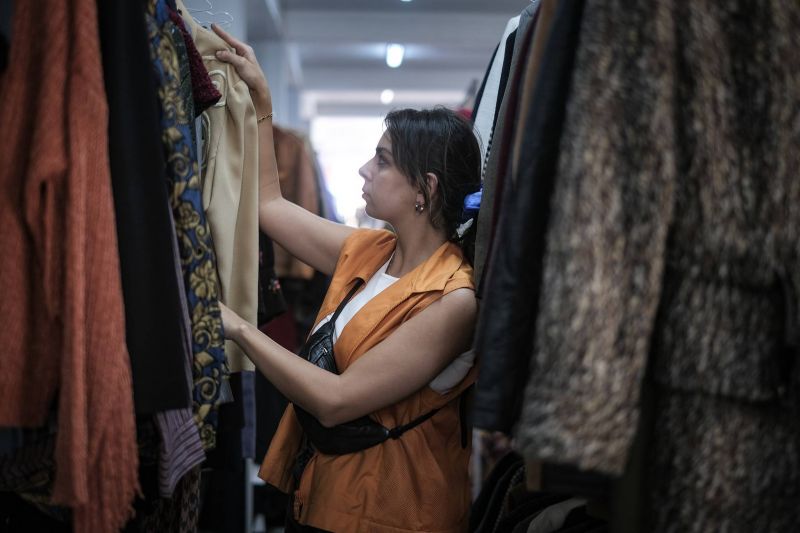
A woman flips through a rack of secondhand clothes. Since the onset of Lebanon's economic crisis, thrift shops have made a comeback. (Credit: João Sousa/L'Orient Today)
BEIRUT — A middle aged woman rummages through a pile of clothes — one of many stacked high in a spacious shop in Beirut’s southern suburbs — while talking on the phone and shaking her head left and right disapprovingly.
“I don’t know if they have that color — you’re lucky if I can find your size,” she said before hanging up.
Dunia Salloum told L’Orient Today her “demanding” 14-year-old daughter has been on the other line.
“She’s young. She wants to dress up like most of her friends do, in fresh clothes and attractive patterns, but I can’t afford that. She only gets what I find here in the local baleh,” she said.
Baleh — the Arabic term for thrift shops — have been in high demand since late 2019 when Lebanon plunged into an economic crisis. According to shop owner Ali Mantash, who is late into his 30s, buying second hand seems to have lost its stigma among the middle class.
“Before that, only seemingly working-class people would come here,” he said.
“I’m making more money than I ever did,” Mantash added with a laugh. “May God protect me from evil eye,” lest he be stricken with calamity for talking about his good fortune.
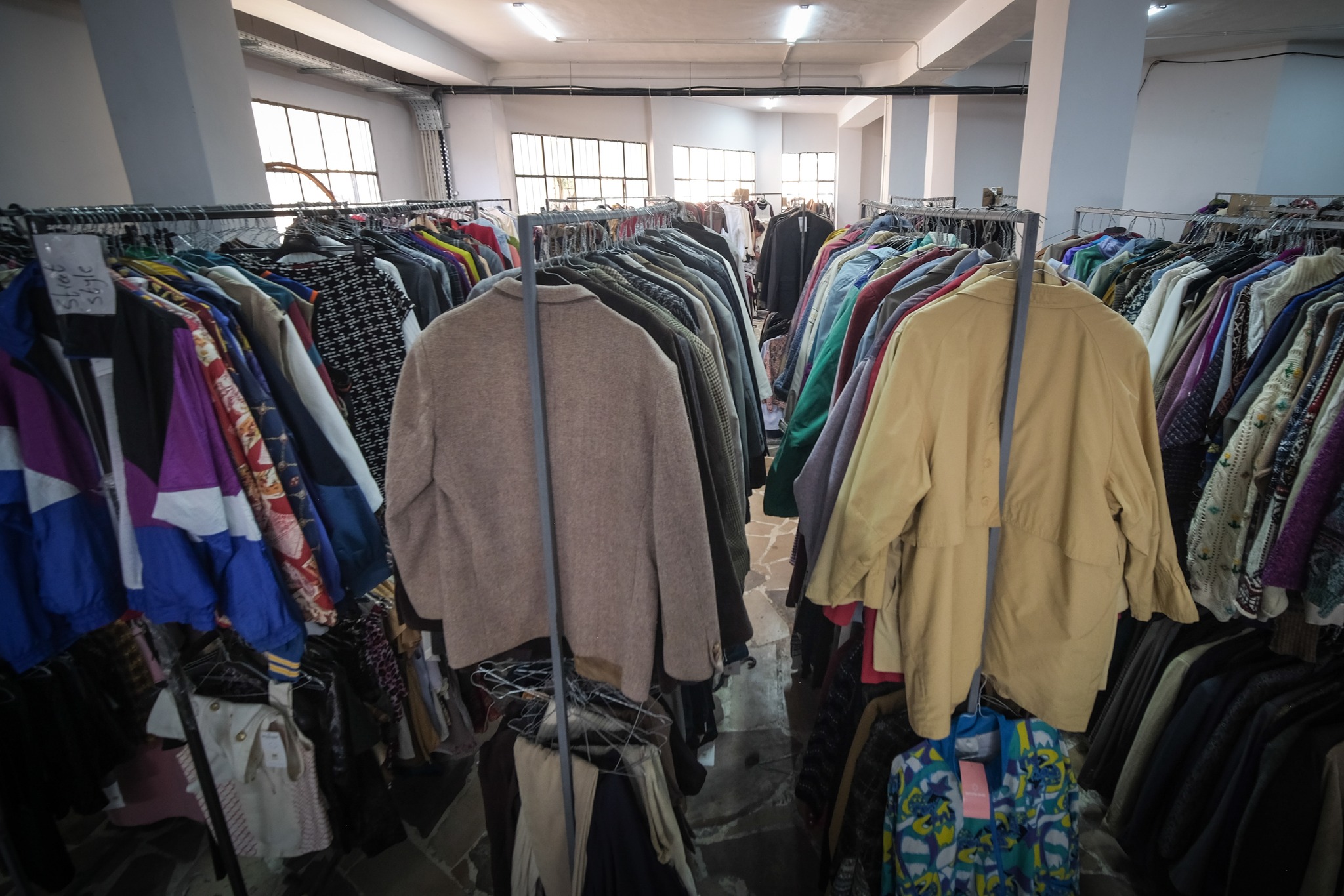 Hundreds of items of used clothing line the racks at Fabric Aid, a social enterprise founded in 2017 that collects, sorts and upcycles second hand clothing. (Credit: João Sousa/L'Orient Today)
Hundreds of items of used clothing line the racks at Fabric Aid, a social enterprise founded in 2017 that collects, sorts and upcycles second hand clothing. (Credit: João Sousa/L'Orient Today)
"How much is this for?" asked a woman as she held up a long, simple green evening dress.
“It’s a bit pricey, LL450,000,” Mantash answered, which amounts to roughly $12 on the parallel market.
The woman, apparently deciding she got a good bargain, headed towards the cashier, carefully counting the hundred thousand lira notes.
Lebanon was once known as the “fashion capital of the Arab world.” It was a popular place for Arabs to indulge in their shopping sprees; most people went to malls or bustling areas with designer retailers, full of clothes imported from abroad.
This all changed when Lebanon’s economy began to collapse.
In August, a World Bank report declared Lebanon’s post-war economic order bankrupt, saying “it is important for the Lebanese people to realize that central features” of that economic system “are gone, never to return.”
As the crisis drove consumers to look for cheaper products, many young Lebanese began to think of innovative new ways to make money. Thus came the rise of thrift shops.
Young entrepreneurs began selling clothes online, sometimes growing big enough to open a physical shop. Others started initiatives to benefit those in need while allowing curious buyers to reuse items that might otherwise have been discarded.
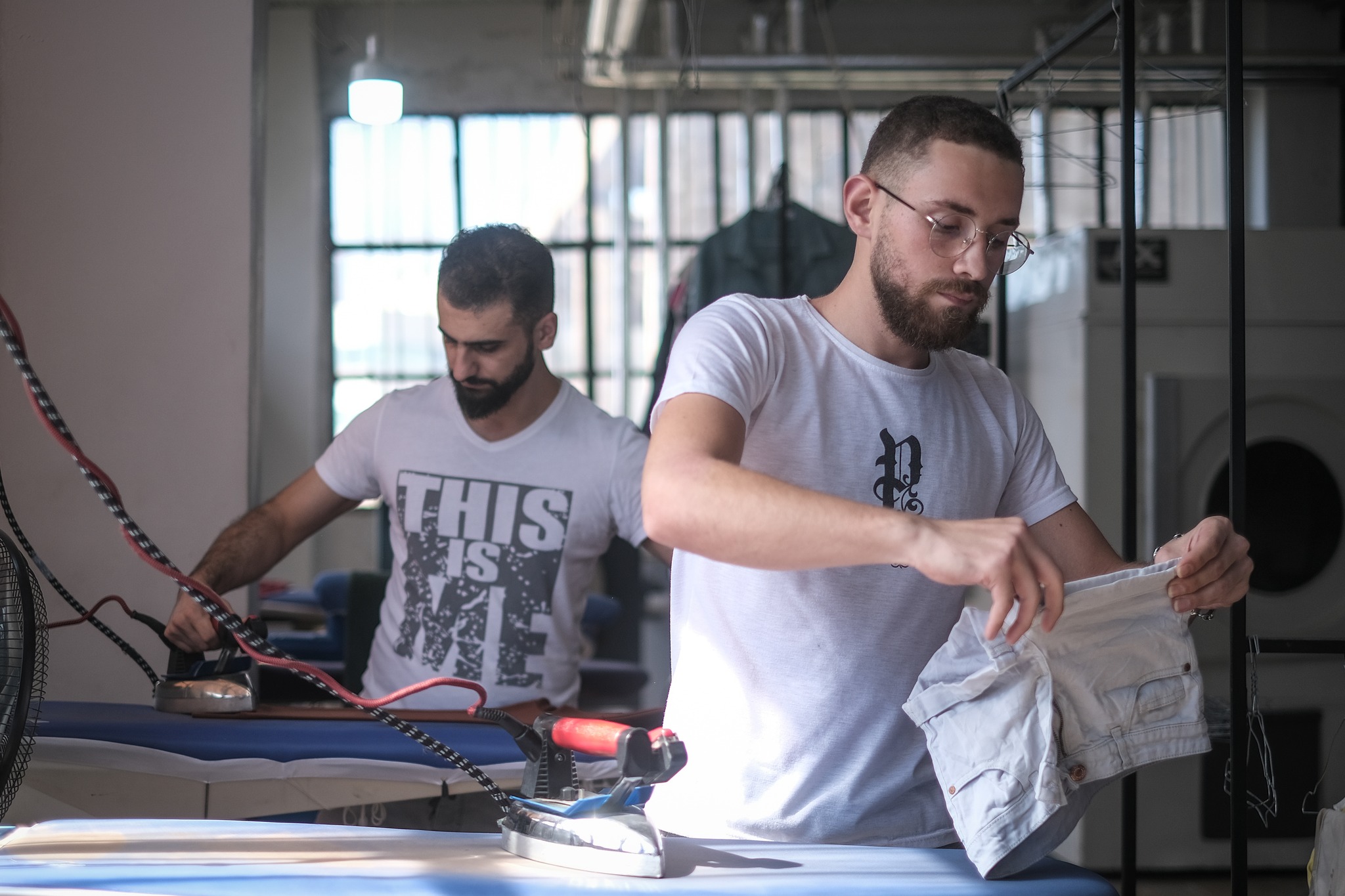 Since the onset of Lebanon's economic crisis, many young entrepreneurs have begun upcycling used clothes. (Credit: João Sousa/L'Orient Today)
Since the onset of Lebanon's economic crisis, many young entrepreneurs have begun upcycling used clothes. (Credit: João Sousa/L'Orient Today)
Lara Dbouk, a 26-year-old speech therapist, initially founded Thrift by Tyre as a side job. The online store caters to people across the country.
“More than a year ago, as the economic crisis worsened, many people in Lebanon were no longer able to shop at the international stores they were once used to,” Dbouk stated. “That’s where my startup came in. I sell international branded items that are either used or new and are of good quality, at a much lower and discounted price.”
Some people sell new items because they may not have liked the size, color, or shape of the item after purchasing it, but can’t return it to the shop. These items would be resold on Dbouk’s page at a discounted price so they don't end up thrown away.
The South did not have as many thrift stores as Beirut, so Dbouk decided to kickstart her initiative to provide affordable clothing to the area. Soon, she was delivering to customers across the country.
“I needed the financial support, and there was a point in time where my thrift [shop] was giving me a higher salary per month than my job as a speech therapist,” Dbouk said.
Dana Hamiyeh is a public relations student at the Lebanese University who describes herself as a “clothes, bags, and shoes hoarder."
“I graduate from university next year, and I still have things in my closet that I haven’t worn since high school,” she said.
When several sponsored pages of online thrift stores started popping up on her Instagram feed offering to buy and sell used clothes, Hamiyeh said it seemed like the perfect plan, especially when she wasn’t able to find a suitable summer job.
When Hamiyeh started selling her clothes online, the sales came slowly but steadily.
Loulya Halawani, a senior marketing manager at Fabric Aid — a social enterprise founded in 2017 that collects, sorts and upcycles second hand clothing — told L’Orient Today that her company placed bins across Lebanon for people to donate their used clothes.
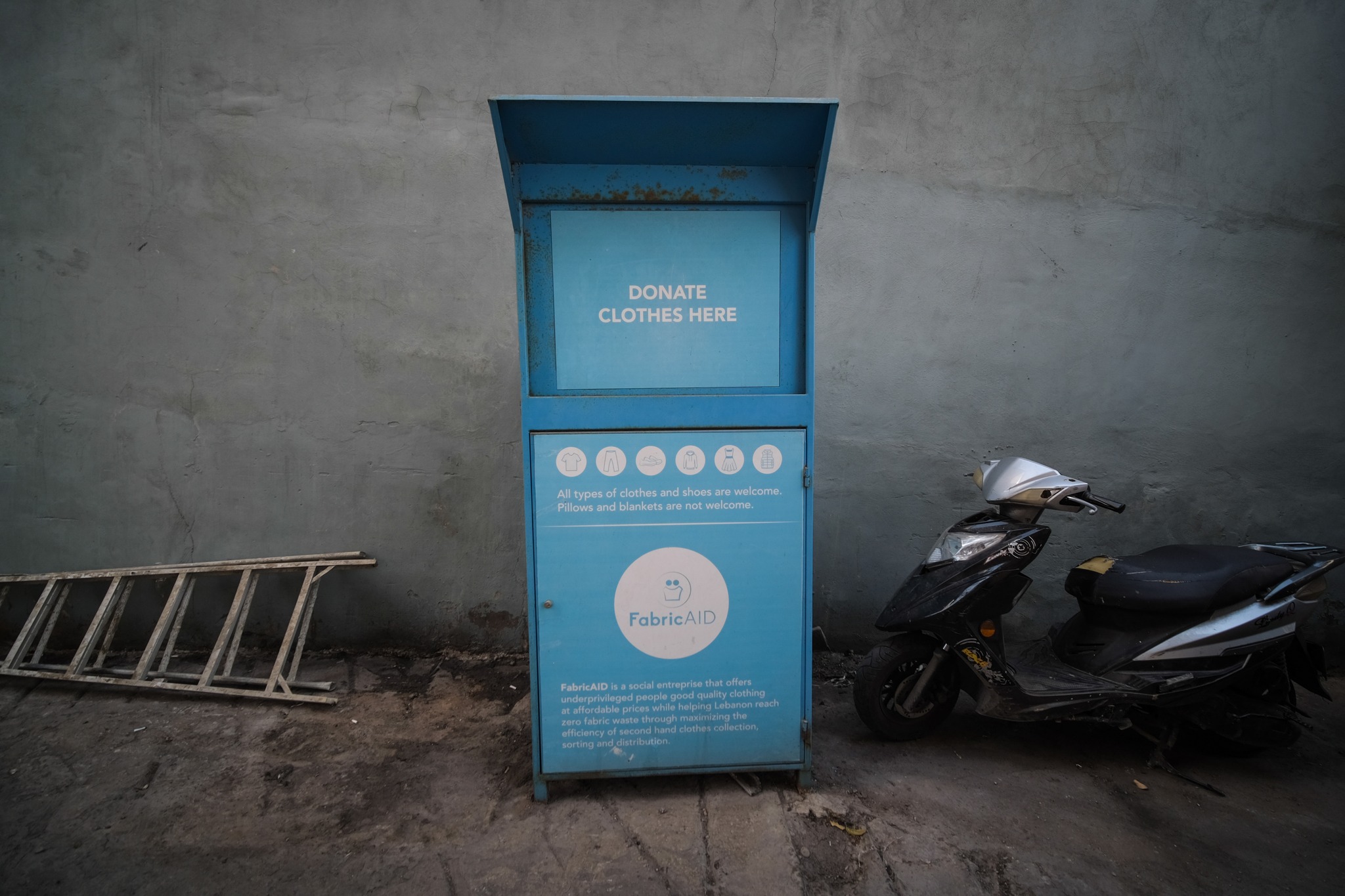 One of Fabric Aid's recognizable blue bins, where people can donate their used clothes. (Credit: João Sousa/L'Orient Today)
One of Fabric Aid's recognizable blue bins, where people can donate their used clothes. (Credit: João Sousa/L'Orient Today)
Fabric Aid cleans the clothes and sells them at prices ranging from LL5,000 to LL25,000 at Souk l Khalanj, a store with branches in Furn al-Shubbak and Tripoli catering to extremely marginalized communities. The clothes are cleaned, hanged, assorted, can be tried on in fitting rooms, and sold at micro-prices.
“Sixteen percent of the donated clothes that are damaged or unfit for sale are upcycled and then sold,” Halawani said.
Six percent of the clothes they receive are vintage, which are then sold at a higher price at Second Base on Monot street in Beirut.
At the end of 2020, Fabric Aid opened Souk Okaz, another store with branches in Hamra, Furn al-Shubbak, Jounieh, Mansourieh, and Tripoli.
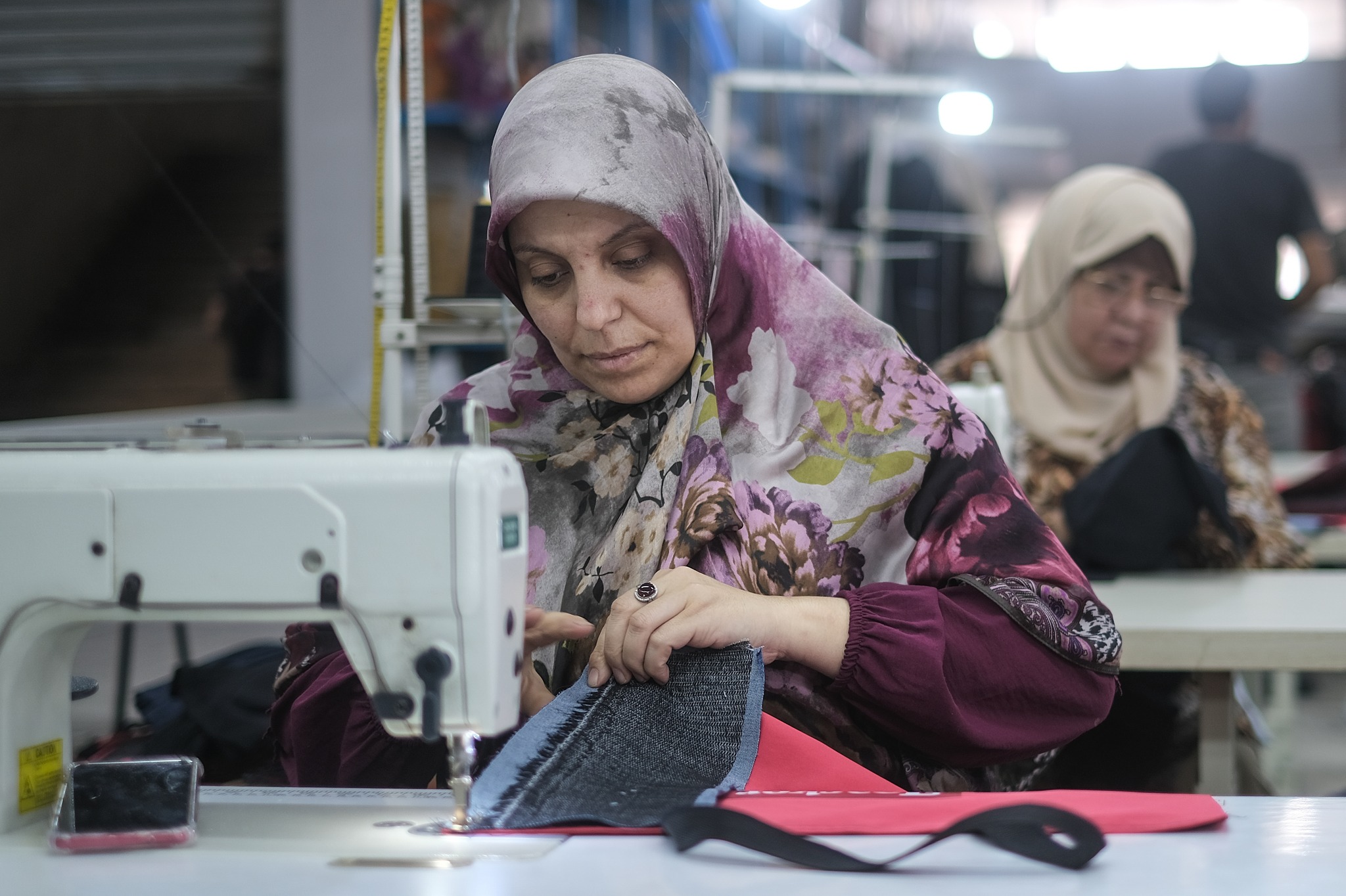 Two women upcycle donated clothing at Fabric Aid, a store that caters to extremely marginalized communities. (Credit: João Sousa/L'Orient Today)
Two women upcycle donated clothing at Fabric Aid, a store that caters to extremely marginalized communities. (Credit: João Sousa/L'Orient Today)
The economic crisis created the need for second hand fashion, but Halawani believes it is in the Lebanese blood “to be very good in styling items, and finding trendy and fashionable ways to wear upcycled and vintage clothing.”
“The economic crisis picked up the case of thrift stores [in Lebanon], but second hand fashion is becoming a global movement,” Halawani concluded.
The social enterprise has already opened branches in Jordan and will be expanding to Egypt soon, with the target of expanding to the whole Arab world.